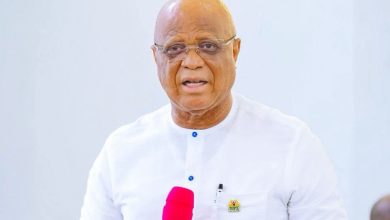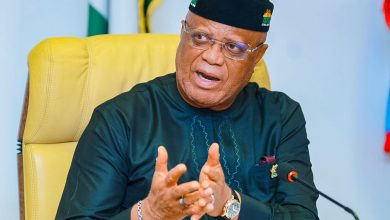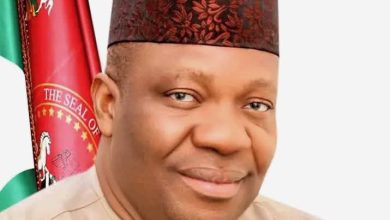
A country’s growth is majorly an internally driven responsibility. Self-motivation is fundamental to advancement. Countrymen and women of a nation with the complement of visionary leadership remain the prime factors of progress.
As it is, the world is clad in competitiveness. A country’s growth, therefore, does not come as a ‘parcel gift’ from one country to another. It must be worked for, attained, and sustained. This is simply the premise upon which nations have risen to their Olympian heights.
READ ALSO: Sovereignty For Sale?
We have seen the limitless paths taken by countries to scale into the privileged club of superpowers vis-à-vis the developed nations. And the parameters have been science and technology; exploration and exploitation of natural resources, and the effective harnessing of human potentials through capacity building.
Development is not rocket science or impregnable factor. It takes a daring commitment to surmount and excel. On the record today as the most technologically advanced countries in the world is United States of America, Japan, China, India, France, North Korea, the United Kingdom, Israel, Russia, South Korea, Canada, Germany and Finland among others. These countries toiled to reach their present heights.
READ ALSO: Bizarre Politics of Democomedy
An American physician and author, Gordon Livingston, posited that “Everything we are afraid to try, all our unfulfilled dreams, constitute a limitation on what we are and could become.” He was quite right. As in our case, Nigeria is mired with so many unfulfilled or unrealised dreams. With just days to attaining 60 years on October 1, 2020, as an independent nation, it is rather a disgusting reality that our dear country Nigeria is still groping in the dark, unable to break forth as the giant of Africa, although she flaunts that accolade as a label.
Uninterrupted electricity is still a mirage in Nigeria, likewise roads. The Ikot Ekpene -Aba Road, a federal highway, a distance of fewer than 25 minutes’ drive, has remained impassable for years. The Calabar-Itu-Ikot Ekpene Highway comes with nauseating experiences for commuters and motorists when travelling through. Similar scenarios play out across the country. When will we get it right? This is the question Nigerians ask daily without getting answers.
Gigantic projects established by the Federal Government years ago, conceptualised to serve as flagships towards driving our technological growth are now moribund. These are Ajaokuta Steel Rolling Mill, Kogi State; Aluminium Smelter Company of Nigeria, Ikot Abasi, Akwa Ibom State; Itakpe National Iron Ore Mining Company, Itakpe Hill Close, Kogi State; Delta Steel Company, Aladja, Delta State.
Others are Nigerian Newsprint Manufacturing Company, Oku Iboku, Akwa Ibom State; Katsina Rolling Mills, Katsina State; Jos Steel Rolling Mill, Plateau State; Osogbo Steel Rolling Mill, Osun State, amongst others. And even when the management and ownership of these multi-billion dollar facilities were outsourced by the Federal Government, there isn’t a blue skyline to cheer about.
In every sequence of hope, despair sets in. The nation’s leaders are yet to match words or promises with actions. They are yet to reinvent our collective dreams towards our anticipated El Dorado. Conversely, it has been tales of futilities from independence in 1960 to date. Our God-given natural endowments spanning natural gas, petroleum oil, tin, iron ore, coal, limestone, niobium, lead, zinc and arable land, among others, and the abundance of manpower are not satisfactorily exploited and marshalled to catapult us into the opulent circle of industrialised and technologically advanced countries of the world.
Juxtaposing Nigeria and Dubai reveals the sad tale of our retrogression. Like Nigeria, Dubai has oil. But unlike Nigeria, their oil became their catalyst and ours, a means for glaring profligacy. We have kept failing to utilise our oil resources to serve as a springboard to development. In the 1950s, the economy of the United Arab Emirates (UAE) was largely reliant on fishing and pearl industry that later declined. But in 1962, as oil was struck in Dubai, their story of leap emerged. Privileged to have a gifted leader, Sheikh Rashid bin Saeed Al Maktoum (June 11, 1912 –October 7, 1990) as the ruler of the Emirate of Dubai, and also the vice-president and 2nd Prime Minister of the United Arab Emirates (UAE), the story of the transformation of Dubai began from its hitherto small cluster of settlements near the Dubai Creek into a modern port city and commercial hub of cosmopolitan attraction.
READ ALSO: Let’s Halt The Ominous Signs Of Despondency
Today, Dubai sits pretty in the global reckoning for its commerce, business, leisure and attractive residency development policy. Without romanticising, UAE utilised the boom from oil exploration to develop and transform Dubai, vis-à-vis the country’s society and economy to its current world acclaim. Has Nigeria done so? Rather, our growth is in corruption and mismanagement of our common patrimony. Funds that could have gone into development are misappropriated.
Mr Abubakar Malami, SAN, the attorney general of the federation and minister of justice, had once claimed that the Economic and Financial Crimes Commission (EFCC) recovered more than $2 trillion of stolen public funds in a period spanning 12 years. In other sane climes, resources are utilised to develop their countries. Unfortunately, Nigeria is still in a deep morass of moral ineptitude in public offices.
Statistics on Dubai within the last 30 years indicate that its population has grown to 2,785,000 with an amazing growth rate of 569 per cent. Oil now accounts for one per cent of the Gross Domestic Product (GDP). The statistics reveal that “One of its main sources of income, and arguably the UAE’s most valuable commercial assets, stem from Dubai’s maritime activities.” Dubai utilises its port being positioned at the entrance/exit of the Persian Gulf. It earns the advantage of being the busiest port in the Middle East.
READ ALSO: Of Nigeria, EFCC And The Corruption Saga
The question then is, don’t we have ports that we can also maximise in Nigeria? Of course, we have them. The six operative ports by the Nigerian Port Authority (NPA) are the Lagos Port Complex, Tin Can Island Port, Rivers Port Complex, Delta Port, Calabar Port and the Onne Port. Another upcoming port is Ibom Deep Seaport.
For years now, Akwa Ibom State has toiled to actualise the project and is constantly on the trail of the Federal Government to ‘see the need’ for it. Whereas by its economic worth and its impending impact, not just on Akwa Ibom but the nation’s economy; Ibom Deep Seaport should get the priority consideration of the Federal Government and not one that is through persuasion.
Worth reviewing too is Singapore’s rapid growth. Experts attribute it to “policies that promoted macroeconomic stability (low inflation, positive real interest rates, sound fiscal management) and limited relative price distortions in the economy (liberal foreign trade policies and an exchange rate policy that avoided prolonged periods of real exchange rate misalignment). As could be seen, other important factors include “a healthy level of infrastructure investment and a commitment to upgrading human capital through investments in education and vocational training.”
Nigeria has to subscribe to ‘Industrialization through Self-Reliance’ as espoused by the Projects Development Institute (PRODA), Enugu. Going cap in hand to take a loan which is fast becoming a ‘habitual policy’ by the Federal Government has to be reviewed. We can enhance the pace of socio-economic development of our country through appropriate technological inputs devised by Nigerians into productive activities.
Records are replete with Nigerians across the globe contributing significantly to the development wheels of other nations. The time is now; to source our best brains to move the country forward. We must get Nigeria away from only the dream level.




